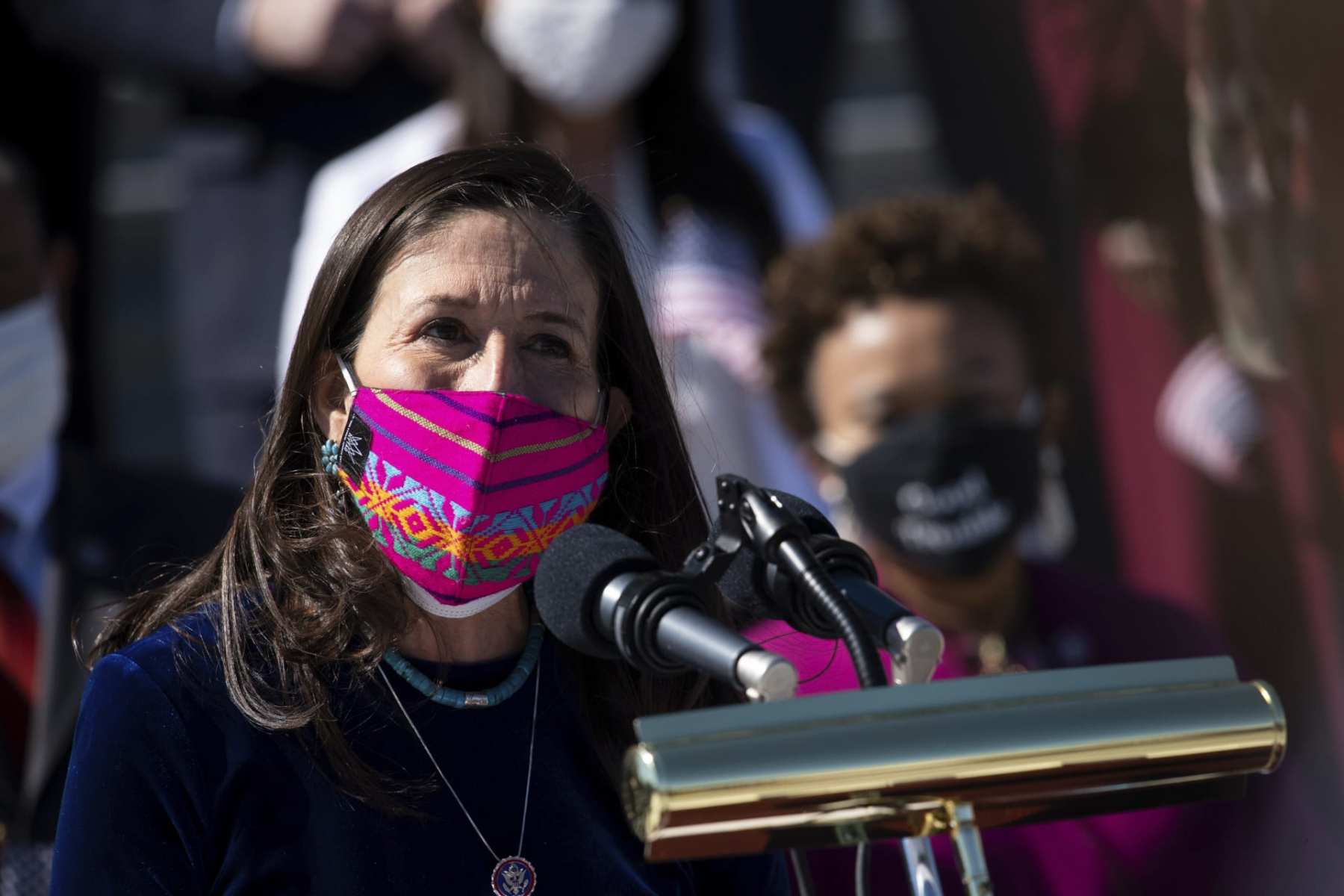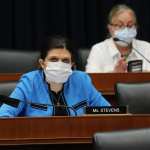About one month after pro-Trump rioters stormed the U.S. Capitol, The 19th reached out to all 143 women in the 117th Congress to ask about their experiences on January 6. Twenty-three shared their points of view from that day. We are also publishing each lawmaker’s full account of that day. Here is what Rep. Teresa Leger Fernandez of New Mexico told The 19th. This transcript has been lightly edited:
It was my third day on the job, and I was pretty darn excited because we had just found out that two Democratic senators would be joining us from Georgia and we were going to certify the new president.
My 20-year-old son — the youngest of three boys — came with me to the office that day. He knew it was going to be a long day, but he was excited so he brought a pillow and wore his suit. I said maybe you shouldn’t, and he said, “I’m wearing my suit.” He agreed to take off his jacket and put it in his backpack and put a sweater on when we walked in, but he wanted to wear a suit in the Capitol.
We knew there was this cloud of tension, but we knew that we were right and that those objections [to the electoral votes] were baseless. There was this disgust about the objections, but also an excitement that we were going to certify the votes and that step should be taken.
So we went to the Capitol. The Democrats had a caucus meeting, and we agreed that we were going to be rotating out of the House gallery. There had been an agreement about how many Republicans and Democrats would be on the floor at one time.
I wasn’t on the floor when the breach happened. I was in my office, and I could see the mob out the windows starting to assemble. You could hear them. You could hear the police sirens. You could hear the flash bombs go off. My son, my chief of staff and I actually headed down toward the basement floor, which connects the Capitol complex.
The police were evacuating Cannon, and there was a bit of confusion in the basement. They said we had to go back up and shelter in place. At that point in time, we went into my empty office — empty because I’m new. No food, new snacks, no safety gear. Nothing except my son’s pillow. We barricaded the door. We felt kind of silly, locked in, staying away from the windows. You could hear things out of the windows.
That’s where we were when the breach happened.
Our TVs were on CSPAN. What we were hearing from our windows before was the explosions going off. At this point in time, we knew there were pipe bombs, and so that’s what it was. My sense was: “This can’t be happening. This can’t be happening. It’s not going to get any worse.” From our windows, we could see some of the crowd. You keep saying they’re just going to stay there, but then you hear the flash bombs. The other emotion you have is anger, just anger. How had we allowed it to get here? With the president doing everything that he had been doing and his attack, I ran on a concept of protecting what we love. And what we love is our democracy. And anytime something that we love is under attack, and it’s hurting, you feel its pain. It had been such an attack on something we love. It was being attacked physically.
We were worried because we were seeing throngs, you don’t know how many thousands there are. There was a lack of understanding and knowledge. What’s happening? And all we could see was what was on the TV. We stayed barricaded until they told us that it was clear. And then we actually went and got food. They had planned to have food available, and they said we actually have the food. So my son and I went to pick up food. I can’t tell you the time.
Later, we saw [Speaker Nancy Pelosi] with her grandson, who we had met the day before. Since I had my son, the two young men had conversations about what they were doing for school. We went back in and you saw the destruction — a kind of weird destruction. In the bathroom, they had pulled all of the drawers out and strewn the women’s tampons and pads. They had pulled a water cooler there and thrown it. Why is that destruction necessary?
By that time, there were National Guardsmen everywhere, and it was just not the same Capitol that we had eagerly walked into and that I had shown my boys that Sunday. My youngest son is really only younger by a minute, he has a twin. They’re gap year kids now, the younger is 20 now. And my other two sons were terrified because they could see what’s happening. I didn’t suffer the direct trauma like those stuck in the gallery.
When my son and I finally got home and were in a safe place, he looked at me and said, “I just need to be by myself,” and I thought, “My God, this kid just went through a traumatic event.” That’s when I cried, and I thought of my colleagues. All the trauma just keeps building.
We flew home two days later. It was much more subdued, when compared with the people who flew home the day after. Several of us women have talked about the need to do defensive training classes because we’re more vulnerable, to be completely honest about it. We have suffered assault and attacks, not because of our political position, but because of our gender.
There was such a vulnerability that day. There’s this sense of the vulnerability of the moment, that we are in this place that we think is safe and secure and that all of a sudden you realize it’s not. And I think there’s a reflection on a physical level and on the philosophical level. We live in the United States, a country that we believed has the world’s best democracy, and it is under attack. In a physical sense, we are in the U.S. Capitol, and it is not safe. There’s something about the layers of vulnerability and violation that are incredibly traumatic.






